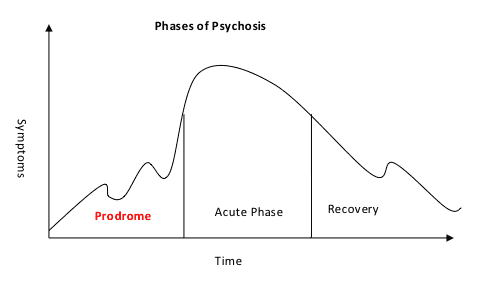Jesse has been hearing, smelling, and seeing things that other people aren't. He has also become paranoid that someone is following him.
After consulting a mental health professional, Jesse was diagnosed with a mental health condition called psychosis, which affects around 100,000 people each year in the US.
 Photo by Nik Shuliahin 💛💙 on Unsplash
Photo by Nik Shuliahin 💛💙 on UnsplashDo you think you have a friend or know someone who may be showing signs of psychosis?
Learn how to recognize the stages of psychosis to help reduce the stigma and normalize conversations around mental health.
3 Stages of Psychosis: An Overview
What is psychosis?
The word psychosis is used to describe conditions that affect the mind, where there has been some loss of contact with reality. When someone becomes ill in this way, it is called a psychotic episode.
-- National Institute of Mental Health
Psychosis develops gradually over 3 stages:
Prodromal stage
Acute stage
Recovery stage
 image from "Phases of Psychosis"
image from "Phases of Psychosis"
Who does psychosis affect?
 Psychosis can affect people of all ages, though it most commonly starts during a person's late teens to mid-twenties. It can be triggered by things such as trauma, substance abuse, physical illness, or a mental health condition.
Psychosis can affect people of all ages, though it most commonly starts during a person's late teens to mid-twenties. It can be triggered by things such as trauma, substance abuse, physical illness, or a mental health condition.
Stage 1: Prodromal
 Photo by Dmitry Schemelev on Unsplash
Photo by Dmitry Schemelev on UnsplashThe prodromal stage is the early stage of psychosis where individuals begin to experience changes in how they perceive things about themselves.
A person may experience number of vague changes to their:
feelings
thoughts
perceptions
behaviors
A person's symptoms may be vague or hard to notice. They may:
feel depressed, anxious, suspicious, or irritable
have difficulty concentrating and interpreting information
have changes in appetite
experience sleep disturbances
⚡Apply your knowledge of the prodromal stage of psychosis:

Bailey is upset today because her friends are too busy to hang out with her.

Jennifer has been feeling anxious and having a hard time sleeping lately.
Quiz
Who is more likely to be in the prodromal stage of psychosis?
Stage 2: Acute
 Photo by Siora Photography on Unsplash
Photo by Siora Photography on UnsplashAt the acute stage, a person may experience distinct symptoms like hallucinations and delusions. These are noticeable and often distressing for the person.
A person with hallucinations may experience:
hearing strange voices
see things that don't exist
feel skin sensations even though nothing is touching their body
smell strange odors or funny taste in their mouth
A person with delusions may experience or believe:
they're being followed, controlled, or plotted against
they have a special power
feel responsible for a negative event such as a plane crash
⚡Apply your knowledge of the acute stage of psychosis:

Joseph thinks his neighbor is plotting against him. He feels paranoid and is hearing hostile voices that others are not hearing.

Jay was playing baseball and accidentally broke his mom's window. His mom got upset with him. Now he feels annoyed with himself and guilty.
Quiz
Who is more likely experiencing symptoms of the acute stage of psychosis?
Subscribe for more quick bites of learning delivered to your inbox.
Unsubscribe anytime. No spam. 🙂
Stage 3: Recovery

The aid to successful treatment for someone experiencing psychosis begins with early medical invention, which occurs at the recovery stage.
A person's recovery stage starts with treatment such as:
antipsychotic medication
psychosocial interventions like therapy and counseling
education and practical assistance for managing the illness
The recovery time and process may differ for each person:
symptoms may become less intense or disappear
people might once again able to cope with their daily lives
⚡Apply your knowledge of the recovery stage of psychosis:
 Alanna is able to eat and sleep well after a few months of treatment. She has been seeing a therapist and taking medications. Although she occasionally has symptoms, they're happening less frequently.
Alanna is able to eat and sleep well after a few months of treatment. She has been seeing a therapist and taking medications. Although she occasionally has symptoms, they're happening less frequently.
 Yoshi went to the doctor with his family for a review, medication treatment, and therapy. Yoshi is still constantly in fear that a secret agent is following him. He attends therapy and is taking his medication.
Yoshi went to the doctor with his family for a review, medication treatment, and therapy. Yoshi is still constantly in fear that a secret agent is following him. He attends therapy and is taking his medication.
Quiz
Who most likely demonstrates signs of being in the recovery stage of psychosis?
Did you know?
Take Action

Now that you can recognize the three stages of psychosis:
Your feedback matters to us.
This Byte helped me better understand the topic.
